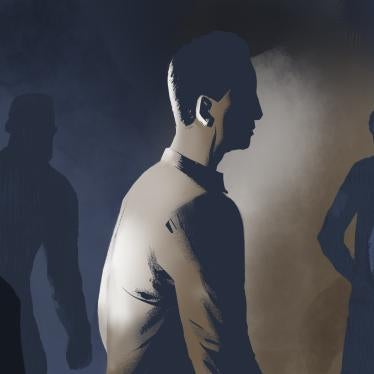Iran’s execution of two men last week for homosexual conduct highlights a pattern of persecution of gay men that stands in stark violation of the rights to life and privacy, Human Rights Watch said today.
On Sunday, November 13, the semi-official Tehran daily Kayhan reported that the Iranian government publicly hung two men, Mokhtar N. (24 years old) and Ali A. (25 years old), in the Shahid Bahonar Square of the northern town of Gorgan.
The government reportedly executed the two men for the crime of "lavat." Iran’s shari`a-based penal code defines lavat as penetrative and non-penetrative sexual acts between men. Iranian law punishes all penetrative sexual acts between adult men with the death penalty. Non-penetrative sexual acts between men are punished with lashes until the fourth offense, when they are punished with death. Sexual acts between women, which are defined differently, are punished with lashes until the fourth offense, when they are also punished with death.
“The execution of two men for consensual sexual activity is an outrage,” said Jessica Stern, researcher with the Lesbian, Gay, Bisexual and Transgender Rights Program at Human Rights Watch. “The Iranian government’s persecution of gay men flouts international human rights standards.”
In addition to the two executions last week, there have been other cases of persecution and execution of gay men in Iran in recent years.
-
• In September 2003, police arrested a group of men at a private gathering in one of their homes in Shiraz and held them in detention for several days. According to Amir, one of the men arrested, police tortured the men to obtain confessions. The judiciary charged five of the defendants with “participation in a corrupt gathering” and fined them.
• In June 2004, undercover police agents in Shiraz arranged meetings with men through Internet chatrooms and then arrested them. Police held Amir, a 21-year-old, in detention for a week, during which time they repeatedly tortured him. The judicial authorities in Shiraz sentenced him to 175 lashes, 100 of which were administered immediately. Following his arrest, security officials subjected Amir to regular surveillance and periodic arrests. From July 2005 until he fled the country later in the year, police threatened Amir with imminent execution.
• On March 15, 2005, the daily newspaper Etemaad reported that the Tehran Criminal Court sentenced two men to death following the discovery of a video showing them engaged in homosexual acts. According to the paper, one of the men confessed that he had shot the video as a precaution in case his partner withdrew the financial support he had been providing in return for sex. In response to the man’s confession, his partner was summoned to the authorities and both men were sentenced to death. As the death penalty was pronounced against both men, it appears to have been based on their sexual activity.
“These abuses have created an atmosphere of terror for lesbians, gays, bisexuals and transgender people throughout Iran,” said Stern. “But arrest, torture and execution are not limited to gays and lesbians. Any group of people deemed ‘immoral’ becomes subject to state-sanctioned persecution and even murder.”
In Iran, executions and lashings are regular means of punishment for a broad range of crimes, not merely same-sex acts. Judges often accept coerced confessions, and security officials routinely deny defendants access to counsel. Late last year, the Iranian judiciary, which has been at the center of many reported human rights violations, formed the Special Protection Division, a new institution that empowers volunteers to police moral crimes in neighborhoods, mosques, offices and any place where people gather. The Special Protection Division is an intrusive mechanism of surveillance that promotes prosecution of citizens for behavior in their private domain.
Human Rights Watch called upon the Iranian government to decriminalize homosexuality and reminded Iran of its obligations under Toonen v. Australia (1994), the Human Rights Committee’s authoritative interpretation of the International Covenant on Civil and Political Rights, to which Iran is party. Toonen v. Australia extends recognition of the right to privacy and the right to freedom from discrimination on the grounds of sexual orientation throughout human rights law.
Furthermore, Human Rights Watch urged Iran to reform its judiciary in accordance with principles for fair trials enshrined in both the Iranian constitution and international human rights law. Finally, Human Rights Watch called upon Iran to cease implementation of capital punishment in all circumstances because of its inherent cruelty, irreversibility, and potential for discriminatory application.






